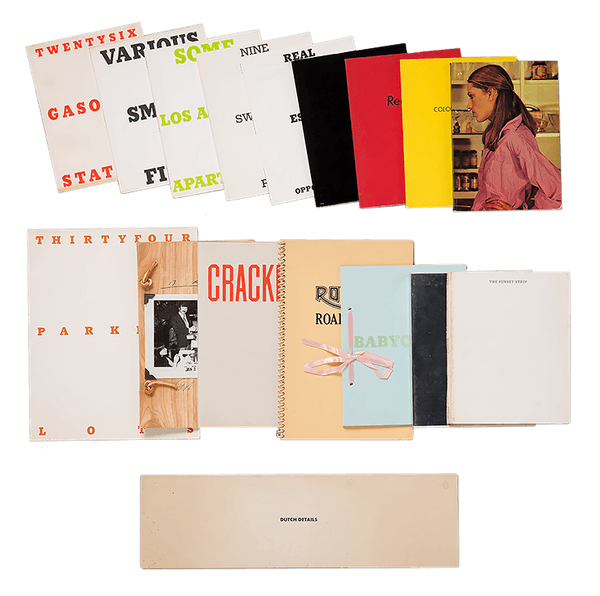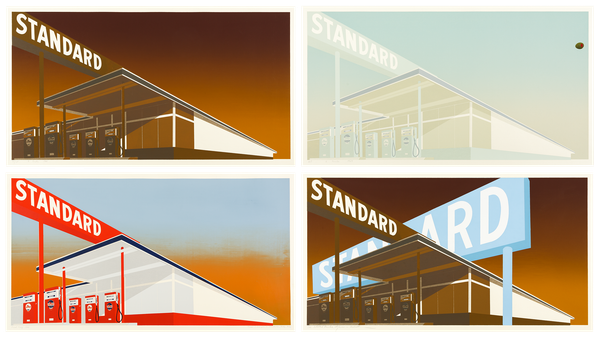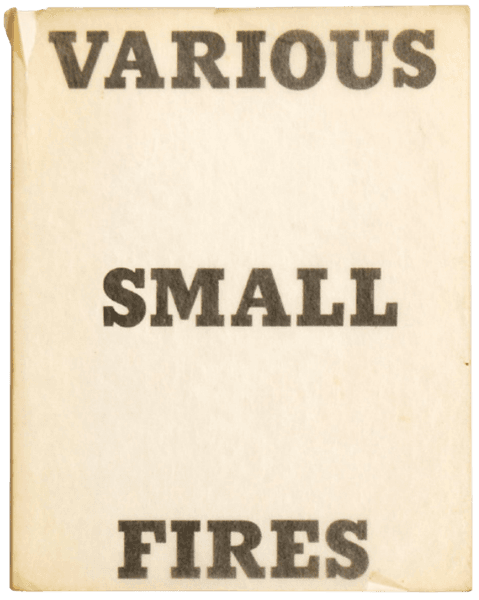Punk
Punk, a 1966 graphite drawing by Ed Ruscha is the only iteration of this word to appear in the artist's early work. It is one of 25 drawings of different words produced in a similar format throughout that year, most of which are now in notable private American collections.
The word Punk carries a rich and varied etymology in both English and its American dialect. The first recorded usage of the word in England in the 16th C. referred to the archaic meaning Prostitute, whereas in America at roughly the same time the word had come into usage also as a noun, but meaning rotten wood used as tinder. The American version may have derived from the Algonquian ponk meaning dust, powder, ashes.
It is in the late 19th C however, that Punk begins to take on the meaning with which it is largely associated today, by 1896 it was understood to mean inferior, bad and something worthless. Underworld slang recorded in 1904 spoke of punk kid, meaning a criminal’s apprentice but with catamitic undertones.
The sense shifted throughout the 1920s and 1930s: by 1923 it was generally used for a young boy or an inexperienced person. Punk day in 1930s circus slang meant a day when children are admitted free. The word also fell into usage as a verb, To punk meant to back out of, an extension of the notion that a Punk was not to be trusted.
It is in the sense of the word meaning young upstart that Ed Ruscha chooses to draw it in 1966. Given that he marketed himself as EDWARD RUSCHA: YOUNG ARTIST at the time, with business cards condescendingly spelling out his name phonetically so those he gave a card to could pronounce it correctly, this drawing can be seen as something of a self-portrait. It is at the very least self-referential.
Five years later in 1971 the first instance of the word being used in the context of punk rock, literally music by young upstarts, was to be found in Dave Marsh’s article in the magazine Creem, the term becoming popularised globally in 1976. The word's apotheosis within a quote also came in 1971 when Clint Eastwood delivered these lines in the movie Dirty Harry:
“I know what you're thinking. Did he fire six shots or only five? Well, to tell you the truth, in all this excitement, I've kinda lost track myself. But being as this is a .44 magnum, the most powerful handgun in the world, and would blow your head clean off, you've got to ask yourself one question: "Do I feel lucky?" Well, do ya, punk?”
Punk
- Artist
- Ed Ruscha (b.1937)
- Title
- Punk
- Medium
- Graphite and pencil on paper
- Date
- 1966
- Size
- 8 1/2 x 6 5/8 in : 21.6 x 16.8 cm
- Inscriptions
- Signed and dated lower left "E. Ruscha 1966"
- Provenance
- James Meeker and Peter Gill; Peter Gill, San Antonio, Janie Beggs Gallery, Beverly Hills; Tom O'Gara, Los Angeles
- Exhibited
- "Ed Ruscha: The Drawn Word," Gallery at Windsor, Vero Beach, Florida, December 7, 2003 - February 1, 2004; "Ed Ruscha: Selected Works, " Edward Tyler Nahem Fine Art, New York, May-6-June 30, 2005
- Literature
- Lisa Turvey, "Edward Ruscha Catalogue Raisonné of the Works on Paper: Volume One: 1956-1976," Yale University Press, New Haven and London, 2014, p.172, D.1966.21 (col. illus.); Ed Ruscha, "They Called Her Styrene", Phaidon, London, 2000, n.p. (col. illus.); Exh. cat. "Ed Ruscha: The Drawn Word," Gallery at Windsor, Vero Beach, Florida, December 7, 2003 - February 1, 2004 n.p. (col. illus.); Exh. cat. "Ed Ruscha: Selected Works," Edward Tyler Nahem Fine Art, New York, May-6-June 30, 2005 p.18 (col. illus.)
- Reference
- C16-16 / A17-27
- Status
- No Longer Available
Available Artists
- Albers Anni
- Ancart Harold
- Andre Carl
- Avery Milton
- Baldessari John
- Barnes Ernie
- Calder Alexander
- Castellani Enrico
- Clough Prunella
- Crawford Brett
- Dadamaino
- de Tollenaere Saskia
- Dyson Julian
- Elsner Slawomir
- Freud Lucian
- Gadsby Eric
- Gander Ryan
- Guston Philip
- Haring Keith
- Hartung Hans
- Hayes David
- Held Al
- Hepworth Barbara
- Hill Anthony
- Hitchens Ivon
- Hockney David
- Hutchinson Norman Douglas
- Jenney Neil
- Katz Alex
- Kentridge William
- Knifer Julije
- Kusama Yayoi
- Le Parc Julio
- Leciejewski Edgar
- Léger Fernand
- Levine Chris
- Marchéllo
- Martin Kenneth
- Mavignier Almir da Silva
- Miller Harland
- Mitchell Joan
- Modé João
- Moore Henry
- Morellet François
- Nadelman Elie
- Nara Yoshitomo
- Nesbitt Lowell Blair
- Nicholson Ben
- O'Donoghue Hughie
- Pasmore Victor
- Perry Grayson
- Picasso Pablo
- Pickstone Sarah
- Prehistoric Objects
- Riley Bridget
- Ruscha Ed
- Sedgley Peter
- Serra Richard
- Shrigley David
- Smith Anj
- Smith Richard
- Soto Jesús Rafael
- Soulages Pierre
- Spencer Stanley
- Taller Popular de Serigrafía
- The Connor Brothers
- Vasarely Victor
- Vaughan Keith
- Whiteread Rachel
- Wood Jonas




